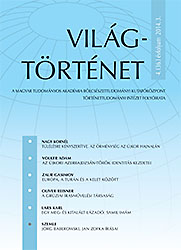A kaukázusi magyarság gondolata a 19. században
The Concept of the Caucasian Hungarians in 19th Century Hungary
Author(s): Péter Pál KránitzSubject(s): Cultural history, 19th Century
Published by: Magyar Tudományos Akadémia Bölcsészettudományi Kutatóközpont Történettudományi Intézet
Keywords: Hungarian ethnogenesis; myth; Millennium celebrations
Summary/Abstract: Throughout the 19th century, the historical research in Hungary went under serious changes, such as institutionalization and division into different branches and sub-disciplines. Historians started to investigate the roots and origins of their nation, and several dozens of different concepts on the Hungarian ethnogenesis emerged, such as the theories of Finno-Ugric, Turkic, Sumerian, Hun, Parthian origins. The concept of the Caucasian Hungarians can be considered as one of these theories; however, it showed genuine distinctness. Throughout the 19th century, there was widespread belief within the whole society and the researchers community, that the mythical and exotic crags of the Caucasus used to be, have been and still were a national home for ethnic Hungarian tribes, or at least for relative folks and nations. Most of the ethnic groups and nations of the Caucasus were considered as relative nations to the Hungarians, and the Caucasus as a region was believed to be the birthplace of the Hungarian nation. The idea led to vivid authorial activities, as dozens of articles, monographs and even poems were written about the Hungarians of the Caucasus. Numerous expeditions were organized in the quest for finding the “lost Hungarians” in the Caucasus between 1819 and the end of the century. Let indirectly led to the emergence of an institutionalized, yet diversified Caucasus-studies in Hungary, and an exhibition on the matter in Budapest, during the 1896 Millennium celebrations.
Journal: Világtörténet
- Issue Year: 2014
- Issue No: 3
- Page Range: 529-544
- Page Count: 16
- Language: Hungarian

